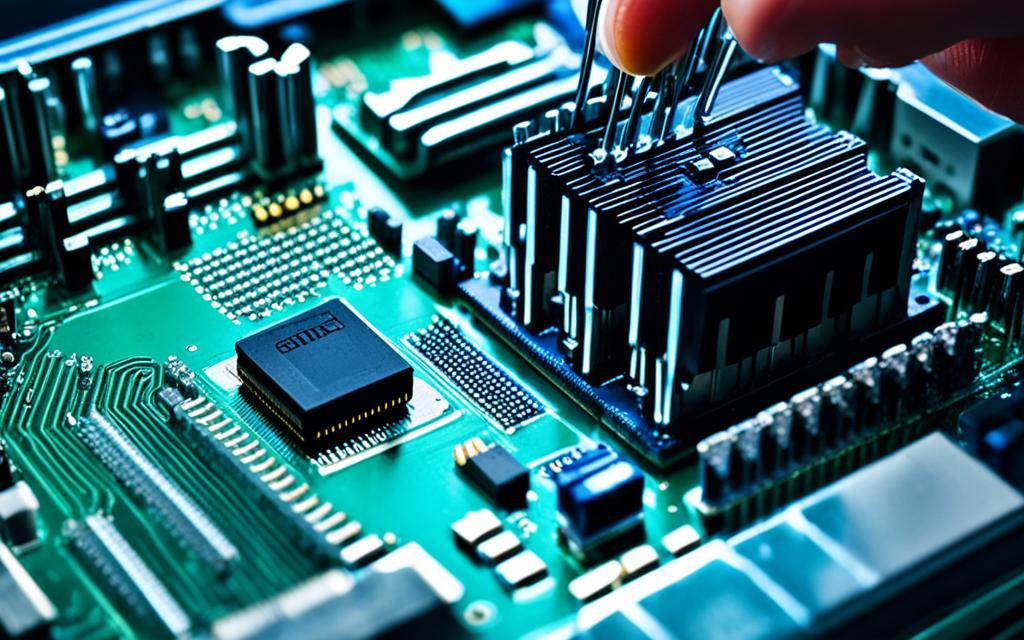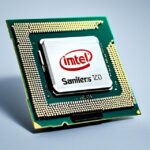Table of Contents
The computing world is always changing. A critical factor in your system’s speed is the CPU clock speed. Since the early 90s, we’ve seen big changes, with speeds jumping from about 2 MHz to over 2.30 GHz in modern computers1. By adjusting your CPU clock speed, you can better tailor your computer for different jobs, from tough tasks to daily use.
Tuning your CPU’s performance is key for getting more out of your system. If you’re a gamer or a professional working with demanding software, changing your CPU speed can hugely impact your work. For instance, the overclocking world saw the 13th Gen Intel Core i9-13900K reach past 9 GHz in December 20221. Learning to adjust your CPU clock speed is not just a skill; it’s a way to boost your machine’s performance and efficiency.
Key Takeaways
- Understanding CPU clock speed is fundamental for optimising overall computer performance.
- Adjusting your CPU clock speed can enhance both performance and energy efficiency.
- Utilising overclocking can yield significant boosts in computational capabilities.
- Overclocking might reduce the lifespan of a CPU; manage your cooling solutions wisely.
- Benchmarking is essential to evaluate the impact of any changes you make.
- Your CPU tuning efforts can cater to diverse needs, from gaming to professional applications.
- Keeping abreast of the latest advancements can greatly inform your tuning strategies.
Understanding CPU Clock Speed
To understand CPU performance, we first look at CPU clock speed. This is how fast a CPU works, measured in gigahertz (GHz). It tells us how many tasks a processor can handle each second. This is key to how good a computer performs tasks.
Definition of CPU Clock Speed
CPU speed shows how quick it processes information. Today’s CPUs work in gigahertz, doing billions of tasks every second2. They can adjust their speed based on the task, using less power on easy tasks. Thus, CPU speed affects both how well and efficiently a computer works.
The Importance of Adjusting Clock Speed
Adjusting clock speed is crucial, especially for heavy computer use. For instance, boosting CPU speed can improve game and program performance significantly3. Overclocking can up performance by 20% in some cases4. On the other hand, slowing down the CPU can save battery life on laptops3.
This balance is essential. A slight speed increase can use much more power, with power use going up by as much as 20% for just a 10% speed boost4. Knowing how to manage CPU speed is key for top performance and efficiency.
| Adjustment Type | Impact on Performance | Effect on Power Consumption |
|---|---|---|
| Increase Clock Speed | Boosts performance by up to 20% | May increase consumption by 15-20% |
| Decrease Clock Speed | Less performance; longer battery life | Reduces energy expenditure |
| Overclocking | Improved efficiency in heavy tasks | Higher power draw |
Why You Might Want to Change Your CPU Clock Speed
Adjusting your CPU clock speed can really boost your computer’s speed and efficiency. This is very helpful for tasks that need a lot of resources. By changing the clock speed, you can make your computer better at handling tough tasks. These can include gaming and processing a lot of data.
Maximising Performance for Resource-Intensive Tasks
For those doing tasks that need a lot of power, increasing the CPU clock speed can be very useful. For example, a 2.6 GHz processor might have a feature that lets it go up to 3.6 GHz5. This is very important for activities like gaming or video editing. High-performance laptops, like the Intel® Core™ i7-8750H, work great for games because they can run between 3.5 GHz and 4.0 GHz, meeting the demands of intense gaming6.
Energy Efficiency and Battery Life Considerations
Lowering the clock speed can help save energy. This adjustment makes laptops use less power. For instance, using a feature called speed stepping helps save energy when the computer is not being used5. Laptops with two or four-core processors use this to make their battery last longer. This lets people manage their power settings better, improving their devices’ battery life6.
By finding the right balance, you can make your device last longer and keep it running well for important tasks.
Finding that balance not only prolongs device usability but also maintains system performance for essential tasks.
How to Change Your CPU Clock Speed
Changing your CPU clock speed can improve how your system runs. First, you need to access power settings. These settings help control your processor’s function.
Step-by-Step Guide to Access Power Settings
Begin by typing “Power” in your computer’s search bar. This action will guide you to the settings you need for adjustments.
Adjusting Advanced Power Settings
After entering the basic power settings, go to “Change plan settings.” Then choose “Change advanced power settings.” This lets you fine-tune your CPU’s power use. It helps match your system’s performance to what you need.
Finding Processor Power Management Options
Look for “Processor Power Management” in the advanced settings. Here, you’ll find sliders to adjust the CPU frequency. Moving these sliders changes how your CPU works. Make sure to save these adjustments to your power plan. They play a role in both performance and how much energy you use.
For those looking to further enhance their systems, try overclocking your CPU. This can give significant performance boosts alongside basic setting adjustments.
It’s vital to keep an eye on how these changes impact system stability and efficiency. Learning to use these techniques will help optimise your computer experience. For more tips, look into how building your own PC can offer deeper insights into managing hardware and boosting system performance. Check out resources for DIY PC builders here. Together with these tips, they can significantly improve how your system performs78.
Overclocking Your CPU: Boosting Performance
In the modern world, overclocking is a popular way to boost CPU performance. This method increases CPU speeds beyond their original settings. This helps with intense tasks like gaming and video editing. For example, a base clock of 100 MHz and a multiplier of 44 gives a frequency of 4.4 GHz. This basic knowledge is key for anyone looking into overclocking9.
The Basics of Overclocking
Overclocking involves exceeding the CPU’s factory speed to gain more power. Tools like Intel’s Extreme Tuning Utility (XTU) for Intel CPUs are vital. These tools help adjust settings and find stable ones through stress testing10. As you increase the frequency, keeping the CPU cool is essential. Systems must keep temperatures below 85 degrees Celsius during heavy usage11.
Risks Associated with Overclocking
Upgrading your CPU’s speed can be beneficial but comes with risks. Issues like voided warranties could lead to extra costs if components break. Overclocking also ups power use and could raise your electricity bill. It may even shorten battery life in laptops10. To avoid overheating, regular maintenance such as dust cleaning is needed. This helps safeguard your system’s stability and extend its life. With careful tuning and monitoring, the benefits of overclocking can outweigh the risks.
| Aspect | Details |
|---|---|
| Purpose | Increase CPU performance beyond factory settings |
| Key Tools | Intel XTU, AMD Overclocking Software |
| Risks | Overheating, instability, voided warranties |
| Cooling Requirements | Adequate cooling necessary to manage increased heat |
| Optimal Temperature | Below 85 degrees Celsius during operation |
Visit this detailed guide for more on safe CPU overclocking. It covers everything you need to know9.
Monitoring and Testing Your CPU Performance
After adjusting your CPU clock speed, it’s crucial to monitor CPU performance closely. Tools like Prime95 or Cinebench help in CPU benchmarking. They help you understand how much you’ve improved or if there are issues. Continuous monitoring is key. It helps you keep an eye on CPU temperature and performance, especially under heavy loads. Overheating can affect the health of your system.
To better understand CPU performance, here are some key points:
- Clock speed is measured in gigahertz (GHz), and it shows how fast the CPU is working12.
- More cores in a CPU mean you can do more tasks at the same time, boosting your computer’s speed12.
- A bigger CPU cache helps in fetching data quickly, improving your computer’s speed12.
- Tools like CPU-Z and HwiNFO are great for checking things like temperature and voltage, keeping your CPU’s performance in check13.
Stress testing your CPU after you’ve made big changes is important. It checks if your computer is stable and doesn’t overheat. During these tests, keeping a close watch is crucial to avoid damages from too much heat or voltage14. For those who overclock, using a cooler that’s better than what your CPU needs is a good idea. It ensures everything runs smoothly14.
In conclusion, regularly checking and testing your CPU’s performance is essential. After making any changes, it ensures things work as expected. Using the right tools and keeping up with your CPU’s health will give you the best performance.
Conclusion
Improving your CPU’s performance by tweaking clock speeds can bring major gains. This includes better system response and efficiency. The tips shared in this fan speed guide show the importance of considering cooling and power needs. Especially important when overclocking for extra performance.
But, proceed with caution. Overclocking can void warranties and might make your system unstable. It’s crucial to find a balance between seeking more efficiency and maintaining system stability. So, keep an eye on things and make smart decisions.
A deeper grasp of CPU capabilities and hardware modification effects is the key to enhancing computing. Keeping these insights in mind will help you use your knowledge effectively. This ensures your system operates smoothly and efficiently for a long time151617.
FAQ
What is CPU clock speed?
CPU clock speed, in gigahertz (GHz), shows how fast a processor operates. A higher speed means the CPU does more tasks in a second. This boosts your computer’s overall performance.
Why is adjusting CPU clock speed important?
Adjusting the CPU speed is key to better computer performance for tasks like gaming and video editing. It helps the computer work smoother and faster in demanding situations.
What are the benefits of overclocking my CPU?
Overclocking boosts a CPU’s speed beyond its standard setting. It’s great for tasks needing high efficiency, like gaming. You’ll get quicker calculations and faster response times in heavy-duty operations.
Are there risks involved with overclocking?
Yes, overclocking has its downsides. It can cause stability problems, higher temperatures, and might void your warranty. It’s vital to have good cooling and keep an eye on system performance to avoid issues like overheating.
How can I monitor my CPU performance after adjustments?
After changing settings, monitoring CPU performance is important. Use tools like Prime95 or Cinebench for benchmarks. Regular stress tests and keeping track of temperatures will ensure your system remains stable and performs well.
How can changing my CPU clock speed affect battery life?
Lowering the CPU speed helps save energy and extends battery life, especially for laptops. Adjusting power settings allows you to balance performance and efficiency. This balance is crucial for the battery life of portable devices.
Source Links
- https://www.codecademy.com/resources/blog/how-to-overclock-cpu/ – How to (Safely) Overclock a CPU
- https://www.techtarget.com/whatis/definition/clock-speed – What is clock speed in computing? – TechTarget Definition
- https://smallbusiness.chron.com/change-processor-speed-58427.html – How to Change the Processor Speed
- https://www.lenovo.com/us/en/glossary/what-is-clock-speed/ – What is Clock Speed & Why Does It Matter?
- https://superuser.com/questions/963883/does-a-cpu-clock-frequency-vary-on-demand – Does a CPU clock frequency vary on-demand?
- https://www.hp.com/us-en/shop/tech-takes/what-is-processor-speed – What is Processor Speed and Why Does It Matter? | HP® Tech Takes
- https://www.wikihow.com/Overclock-a-CPU – How to Overclock a CPU (with Pictures) – wikiHow
- https://www.pcworld.com/article/406279/how-to-overclock-your-pcs-cpu.html – How to overclock your PC’s CPU
- https://www.intel.com/content/www/us/en/gaming/resources/how-to-overclock.html – How to Overclock Your Unlocked Intel® Core™ Processor
- https://medium.com/@michael.toback/overclocking-mini-pcs-part-1-a-beginners-guide-to-boosting-performance-abfb25790a20 – Overclocking Mini PCs- Part 1: A Beginner’s Guide to Boosting Performance
- https://www.digitaltrends.com/computing/how-to-overclock-your-cpu/ – How to overclock CPU safely with XTU, Ryzen Master, or BIOS | Digital Trends
- https://www.jawa.gg/blog/how-to-increase-cpu-performance/ – How to Increase CPU Performance
- https://www.ionos.com/digitalguide/server/know-how/how-to-overclock-cpu/ – How to overclock your CPU: fine-tuning for your processor
- https://www.tomshardware.com/how-to/how-to-overclock-a-cpu – How to Overclock Your CPU: Get the Most GHz from Your Processor
- https://techpaul.wordpress.com/2009/11/07/upgrading-your-cpu-conclusions/ – Upgrading Your CPU – Conclusion(s)
- https://softwareg.com.au/blogs/computer-hardware/how-to-change-cpu-clock-speed – How To Change CPU Clock Speed
- https://community.acer.com/en/discussion/547721/how-do-limit-the-cpu-clock-speed-cooling-cant-keep-up – How do limit the CPU clock speed? (cooling cant keep up)








